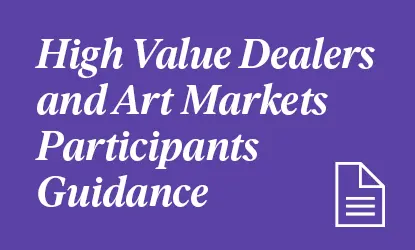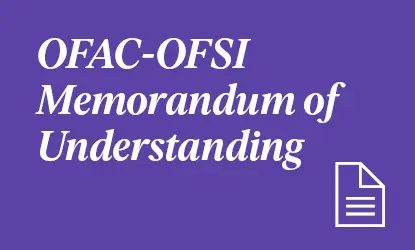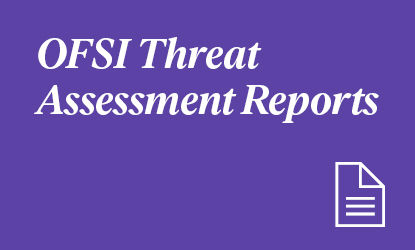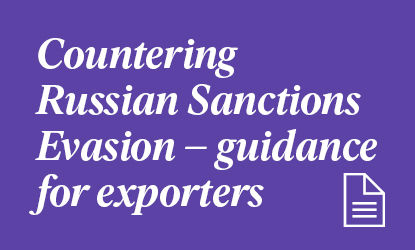Introduction
As we enter the second half of 2025, changes to the UK sanctions and export regime have been coming thick and fast. With major shifts in global sanctions policy against an evolving geopolitical backdrop, together with an uptick in enforcement, increased co-operation between regulators internationally, and the introduction of new regulators and penalty regimes, UK exporters who trade internationally are having to get to grips with ever more complex and diverging rules and regulations.
There has also been substantial information and guidance published by the regulators this year, to help exporters comply with their legal duties. However, the more information which becomes available the less exporters can say that they were not aware of what is required. Ignore the available guidance at your peril!
Highlights in this edition include:
- Key regime and legal changes in 2025 so far
- UK sanctions enforcement activity
- Relevant and available guidance to ensure compliance (with handy links)
We also take a closer look at a common issue: ownership and control, and consider what is on the horizon for the second half of the year and beyond.
The Year so Far – Key Regime Updates
Export control - dual-use items
The Export Control (Amendment) Regulations 2025 came into force on 20 May 2025 and amended the Export Control Order 2008 (the “2008 Order”) and Council Regulation (EC) No 428/2009 (“the Dual-Use Regulation”) which set up a regime for the control of the export, transfer, brokering and transit of dual-use items.
Updates were made to the military and dual-use lists in the 2008 Order and the maximum level of fine that can be imposed for summary offences was increased from £1,000 to £2,500. For more serious export control offences the maximum fine is still unlimited.

Dual-use at a glance
Dual-use items are goods, software or technology which can be used for both a civil and military purpose. They are controlled because of the risk that they could be used for purposes that could threaten international peace and security. Any items subject to controls will be listed on the UK Strategic Export Control Lists. Licences can be obtained from the UK Export Control Joint Unit for the export of dual-use goods to certain jurisdictions, although there are also outright prohibitions on export where a licence will not be granted.
Dual-use restrictions form part of the UK’s export control regime, but it is important to be aware that dual-use restrictions can also apply to sanctions regimes.
Exporting dual-use goods without a licence or in breach of a prohibition is a criminal offence, with penalties ranging from revocation of licences and seizure of goods to an unlimited fine and/or imprisonment for up to 10 years.

Trade sanctions - Russia
On 24 April 2025 a raft of new trade sanctions were introduced against Russia prohibiting the export, supply and delivery, and making available to, or for use in Russia, certain chemicals, electronics (gaming controllers being included in that due to their potential use in piloting drones), machinery, plastics and metals. Changes were made to the following categories of goods:
- Critical industry goods and technology
- Energy-related goods and technology
- Defence and security goods and technology
New prohibitions were also imposed on the transfer, making available and provision of ancillary services related to certain technology and software, related to the following industries:
- Energy
- Advanced and industrial manufacturing technology
- Business enterprise
- Industrial design
- Oil and gas
Import bans apply to synthetic diamonds processed in third countries and helium.
Financial sanctions – Russia
In May 2025 the UK government announced a package of wide-ranging sanctions on Russia in its support of Ukraine. Over 100 individuals, organisations and ships were designated as subject to an asset freeze, including ships involved in the transportation of oil and entities involved in Russia’s financial sector, as well as individuals and entities involved in supporting the Russian defence sector.
On 21 July 2025 the UK government announced that another 135 ships had been designated as subject to an asset freeze. More designations are expected.

Spotlight on … financial sanctions
Financial sanctions can be imposed by the UN and/or the UK to restrict certain individuals’ or organisations’ access to financial markets, funds and economic resources and limit provision of certain financial services. They are imposed for a variety of reasons, such as to coerce a regime into changing their behaviour or to stop a target accessing funds or economic resources which are being used to finance their offending behaviour, such as terrorism or nuclear proliferation.
UK financial sanctions apply to all persons or organisations within the UK, and to all UK nationals wherever in the world they are located. This means that not only organisations or individuals who do business in the UK are required to comply, but those that are established under UK law, including their branches, must also comply, regardless of where in the world their activities take place.
The most common type of financial sanction is an “asset freeze”, where an individual or organisation is restricted from accessing funds and economic resources. Anyone subject to an asset freeze in the UK will be listed on the Office of Financial Sanctions Implementation’s List of Consolidated Financial Sanctions Targets.
You could be dealing with an entity which is not listed by OFSI, but it might be owned or controlled by an entity or individual which is listed. This means that both the listed entity and the one it owns or controls are both subject to an asset freeze and you should not deal with either of them. For more on ownership and control, see below.

UK lifts sanctions against Syria
In April 2025 the UK partially suspended significant sanctions against Syria which have been in place for over a decade following the fall of the Assad regime in December 2024. Sanctions on the energy and transport sectors and financial and banking related sanctions have been revoked. However, several sanctions remain, including the export of luxury goods such as precious metals and diamonds, military goods or technology, and goods or technology related to chemical and biological weapons, internal repression and interception and monitoring. Some financial sanctions also remain against those previously involved in the Assad regime.
The lifting of these sanctions is intended to help Syria rebuild its economy following the fall of Assad. However, businesses looking to re-enter the Syrian economy should continue to exercise caution and carry out thorough due diligence before undertaking any activities in the area.
Reporting requirements
There is a legal requirement on “relevant firms” in certain sectors to report suspected breaches of UK financial sanctions to the Office of Financial Sanctions Implementation (“OFSI”). This reporting obligation applies to firms regulated by the Financial Conduct Authority, currency exchange offices, statutory/local auditors, accountants and lawyers, estate agents, casinos, those making, supplying or selling articles made from gold, silver, platinum, palladium or precious stones or pearls, crypto asset exchange providers and custodian wallet providers.
From 14 May 2025, the list of “relevant firms” was extended to include high value dealers, art market participants, insolvency practitioners and letting agents. The changes were announced in November 2024, in response to concerns that sanctions breaches in these sectors were not being proactively reported but did not come into force until May 2025.
Failure to comply with a reporting obligation is a criminal offence. However, depending on the nature of the report any potential breach could also incriminate your firm and/or individuals. Always take legal advice if you are unsure of your position. Voluntary reporting is also encouraged by OFSI, even where there is no statutory duty to report, but it is not mandatory and legal advice should always be sought before doing so.
UK Sanctions Enforcement
As pressure mounts for UK sanctions to have a lasting impact, the OFSI has been ramping up financial sanctions enforcement, but with the Office of Trade Sanctions Implementation (“OTSI”) still to publish any enforcement action, and only limited details of breaches published by HMRC, it is very much a tale of two regimes at the moment. However, the recent financial sanctions enforcement does paint a picture of key and current sanctions compliance risks.
Breaches: Requests for information
OFSI has used its powers to convict one individual, fine one organisation, and publish disclosures against three charities for failing to respond to various OFSI requests for information.
- Two UK individuals and companies associated with them were designated under the Counter-Terrorism sanctions regime in 2024 for allegedly funding Hamas and the Palestinian Islamic Jihad (both proscribed terrorist organisations), via fundraisers held in conjunction with Gaza Now. One of the individuals, Aozma Sultana, has now been convicted of failing to provide OFSI with information about her finances, and is due to be sentenced in August. The Charity Commission have also launched a statutory inquiry into the fundraising undertaken to determine how funds have been raised and used and whether these can be accounted for.
- A shipping company, based in Cyprus, received a fine of £5,000 for failing to respond to an OFSI request for information. The company, Svarog Shipping & Trading Company, were aware that OFSI were seeking information from them, and that they would receive a request for information, but they failed to respond until multiple follow-up communications had been sent, and OFSI had contacted their auditors directly. Although the company was not found to have breached the underlying sanctions regime, they were fined as no reasonable excuse was provided for the breach.
- In respect of the three disclosures, each of these related to different registered charities, who, despite being contacted by OFSI through the email address available for trustees on the Charity Commission’s website – failed to respond for relevant requests for information. OFSI considered that disclosures should be made as each of the charities was operational and registered with the Charity Commission when the request for information was received and that trustees have a duty to ensure that their contact information held by the charities regulator is up to date.
Each of these breaches highlights that anyone receiving a request for information from OFSI should act quickly to ensure they respond before the relevant deadline, or risk facing a range of enforcement action and further investigation. Cooperation with the regulator is not only a legal requirement but if full and open, may constitute mitigation in any penalty to be applied.
OFSI fines
Three key fines issued by OFSI highlight the importance of having, carrying out, and following through on appropriate sanctions policies and procedures. Two of these fines included repeated payments, which increases their severity.
- Integral Concierge Services Limited (“ICS”) were fined £15,000 in respect of 26 payments made and received in connection with property management services provided to an asset freeze target in breach of UK sanctions, totalling £15,487. Not only did ICS manage the property on behalf of the designated person, but they breached reporting requirements in place under two general licences. This was not in and of itself a breach, but was an aggravating factor in OFSI’s decision making, as was the viewpoint that ICS took that it was not necessary to educate themselves on sanctions, despite having an extremely limited knowledge of the sanctions regime and providing property services for Russian and Ukrainian individuals. The investigation arose from pro-active investigation by OFSI, and the lack of voluntary disclosure by ICS was considered in the fine issued.
- In closing its Moscow operations, an international law firm made six payments to designated persons within one week in 2022. The fine imposed was £465,000 in respect of breaches totalling £3,932,392.10. Key to the low level of the fine was a self-report made to the regulator by the firm's London office, their cooperation throughout OFSI’s investigations, and the fact the payments had been made as the firm attempted to withdraw from the Russian market. Despite key sanctions checks being undertaken, and advice given to the firm's Moscow office not to make certain payments, processes were overlooked and monies sent to designated bank accounts and to a wholly-owned subsidiary of a designated bank, with finance processes having been overridden by senior staff members.
- Markom Management Limited (“MML”), a company which provided fiduciary, management, administration, bookkeeping and accounting services to companies in various jurisdictions, was fined £300,000 in respect of a payment made to a designated person. MML was part of Markom Group, including Markom Management Cyprus (“MMC”). MMC provided the same services as MML, but to companies registered and operating in Cyprus. A designated person made a payment to a client of MMC through Gazprombank, a non-EU bank in Moscow. As the transaction did not involve MML it was not prohibited under the UK sanctions regime. However, MML senior management was made aware that part of the transfer included an overpayment, and an instruction was issued by MML to Gazprombank for transfer of the overpayment from MMC's client's account to the designated person's account. This was in breach of UK sanctions. Factors which led to imposition of the penalty included the fact that MMC's client had previously been a client of MML, so there was a historic connection between the two entities, and MML's lack of appropriate processes and inadequate knowledge of sanctions compliance.
These decisions highlight the importance of having effective sanctions policies and procedures in place, and of ensuring that these are robust and cannot be easily overridden. They also demonstrate the measurable impact that self-reporting and cooperation can have in the case of investigation with the regulator, with the fine received by the law firm significantly reduced because of their actions. MML’s disclosure to OFSI was not eligible for a voluntary disclosure discount but the proposed fine was reduced following MML’s application for ministerial review.
First NCA prosecutions for breach of UK sanctions
The former governor of Sevastopol and his brother have this year been the first people convicted under the Russia Regulations. In a decision published in April, it was revealed that despite being aware of UK sanctions in force against him, Dmitrii Ovsiannikov breached sanctions, and drew his wife (Ekaterina Ovsiannikov) and his brother (Alexei Ovsiannikow) into supporting him in such breaches. Although these prosecutions are of individuals, it highlights the importance for organisations of ensuring that appropriate checks and records of sanctions status are carried out and retained.
- Ekaterina Ovsiannikov transferred money to Dmitrii Ovsiannikov’s bank account, and his brother bought and insured a car for his use, lent him his credit card, and paid for the private school fees of two of his youngest children. The total value of the breaches was £130,000, and both brothers were convicted of breaches of the UK sanctions regime, with custodial sentences imposed (suspended for the brother).
- Mrs Ekaterina Ovsiannikov was acquitted, as at the date she transferred money to her husband, it was unclear whether she knew he was subject to financial sanctions. Alexei Ovsiannikow knew of his brother’s sanctioned status when Dmitrii Ovsiannikov was arrested for breaching sanctions in January 2024, and his conviction stems from the fact that the payments he made for school fees were after this point.
The convictions of both Dmitrii Ovsiannikov and Alexei Ovsiannikow are due to be appealed, however, as the first successful prosecutions under the Russia Regulations, the focus on knowledge in the conviction of Alexei Ovsiannikow and acquittal of Ekaterina Ovsiannikov is key to understanding how criminal enforcement will likely place weight on knowledge in future.
Trade sanctions
Since their establishment last year, OTSI are yet to publish any details of investigations or enforcement actions which they are involved in, and in the interim, companies can only rely on the limited information published by HMRC in assessing enforcement trends.
Only two notices of compound settlements relating to breaches of the sanctions regime have been published in the last year. In total, seven compound settlements relating to breaches under the Russia Regulations have been published since February 2022. The highest penalty to date has been issued this month - £1,160,725.67 – to a UK exporter that made goods available to Russia in breach of the Regulations.
Unlike OFSI, HMRC only publishes very limited details of trade sanctions breaches, meaning that details of common themes, or current key areas of investigation cannot be identified from the penalties published. However, key risk areas remain sanctions circumvention, and diversion of products to Russia. As always, carrying out appropriate checks, and keeping records of due diligence undertaken and appropriate measures put in place will support organisations in demonstrating compliance if required.
Guidance and Publications
Trade and financial sanctions derive from various UK Acts of Parliament and regulations, and keeping on top of the ever-increasing changes and updates can be all consuming. UK regulators recognise this and are committed to publishing guidance and other publications to assist exporters to comply with their duties. However, now there really is nowhere to hide and whilst ignorance was never a defence, carrying out due diligence and keeping records of that is even more critical to enable you to demonstrate that you “did not know or had no reasonable cause to suspect” (the defence for breach of trade and financial sanctions in the UK) that what you were doing was breaching sanctions.
Here we look at some of the guidance and publications issued this year so far, and what it could mean for you. Not surprisingly, OFSI has published the most material, but we expect more to come from other regulators as enforcement in the UK ramps up.
JANUARY 2025

Hot on the heels of the widening of the list of “relevant firms” required to report sanctions breaches, OFSI published guidance for high value dealers and art markets participants. This guidance is aimed at those trading in luxury goods, such as art, luxury cars, wines and spirits, antiques, and precious metals and gemstones, where the transaction value is EUR 10,000 or more in a single transaction or a series of linked transactions.
Proactive reporting was seen as low in these sectors. By widening the list of firms required to report, OFSI’s aim is to improve understanding of how financial sanctions are being implemented in the impacted sector so they can raise awareness and encourage better compliance.
The guidance explains common evasion practices in these sectors, appropriate due diligence, reporting obligations, licencing, compliance and penalties, and ownership and control, as well as the link between financial and trade sanctions. It is being reviewed and updated regularly.

OFSI and its US counterpart, the Office of Foreign Assets Control (“OFAC”), have made no secret of their long-standing and collaborative relationship. In 2022, they announced their Enhanced Partnership following an extensive technical exchange, including sharing of best practices and strengthening working relationships. On the two-year anniversary of this partnership, they signed a Memorandum of Understanding (“MOU”), which was published on OFSI’s website at the start of the year.
The MOU sets out the terms on which both OFAC and OFSI will cooperate in the implementation of financial sanctions, including strengthening the ability to share information. Such information includes (1) administrative records kept during an investigation; (2) details of those involved in breaches of either regime; (3) reports of suspected breaches and blocked property/frozen assets; (4) information disclosed during a licence application; (5) training materials on best practices; (6) reporting statistics and economic analysis; (7) names of persons or entities that have or may soon be subject to restrictions; (8) other unclassified information obtained during performance of OFSI or OFAC’s activities.
OFAC is well-known for taking a hard line on sanctions breaches, with fines reaching tens to hundreds of millions. OFSI is keen to learn from them, and with more powers and increasing frequency of use of those powers the collaboration appears to be bearing fruit.
FEBRUARY - JULY 2025

This year OFSI has published a series of sector-specific threat assessment reports, starting with a report for the financial services sector in February. Further reports for legal services, property and related services, art market participants and high value dealers and cryptoassets were published between April and July 2025.
The reports are intended to assist UK stakeholders in key UK sectors to comply with financial sanctions, by highlighting threats and vulnerabilities and encouraging a risk-based approach to sanctions compliance.
You can access the reports here: OFSI Threat Assessment Reports - GOV.UK

The OTSI published specific guidance on common Russian sanctions evasion practices, to assist UK exporters to spot evasion practices and reduce the risk of their business being targeted by those seeking to evade sanctions.
The guidance covers key circumvention red flags and due diligence best practice.
New guidance is published frequently, and existing guidance is being updated in real time. Consulting relevant guidance should be part of your export and sanctions compliance regime, and the cost of ignoring it or not considering it fully cannot be underestimated.
Get in touch if you need specific UK sanctions advice or are unsure how relevant guidance applies to your business.
Spotlight: Ownership and control
One of the most common queries we get from clients is how to determine whether an organisation is designated as subject to UK financial sanctions due to its ownership and control structure. The ownership and control test means that companies which are not expressly listed could be treated as such because they are owned or controlled by a designated entity or individual.
The UK government’s general financial sanctions guidance states that an entity is owned or controlled directly or indirectly by another person in any of the following circumstances:
- the person holds (directly or indirectly) more than 50% of the shares or voting rights in an entity;
- the person has the right (directly or indirectly) to appoint or remove a majority of the board of directors of the entity;
- it is reasonable to expect that the person would be able to ensure the affairs of the entity are conducted in accordance with the person’s wishes.
If any of these criteria are met, and the person/entity who owns or controls an entity is also a designated person/entity, then financial sanctions will also apply to that entity and their assets should be frozen. It will also be prohibited to make funds or economic resources available directly or indirectly to that entity, as well as the person/entity which owns or controls it.
The guidance also covers minority and joint interests and confirms that OFSI would not aggregate different designated persons’ holdings in a company.
It is important to remember that relevant firms have certain reporting obligations to OFSI when they have evidence that they have or are dealing with a designated person/entity (see above).
There have also been some recent court judgements on ownership and control, not surprisingly all relating to the UK Russian sanctions regime, which rather than clarify matters have caused some confusion. Whether an entity is designated due to its ownership or control structure will depend on the applicable sanctions regime, but for the purposes of UK Russian sanctions an entity is owned or controlled directly or indirectly by another person or entity if one or both of two conditions are met. The first condition relates to holding over 50% of the shares or voting rights in the entity or having the right to appoint or remove most of its directors and is usually a question of fact and straightforward to assess. However, the second condition is much broader, and relates to a subjective assessment of whether the person or entity could control the other entity’s affairs if they chose to.
The case of PJSC National Bank v Mints [2023] EWCA Civ 1132 considered the second condition, where the Court of Appeal overturned the decision of the High Court and held that a state-owned Russian bank was to be regarded as controlled by President Putin. There were non-binding remarks made by the Court of Appeal suggesting that every company in Russia may be controlled by President Putin and therefore subject to UK financial sanctions.
Following these remarks OFSI was quick to issue guidance clarifying its approach to control via public office, which says that “There is no presumption on the part of the UK government that a private entity is subject to the control of a designated public official simply because that entity is based or incorporated in a jurisdiction in which that official has a leading role in economic policy or decision-making. Further evidence is required to demonstrate that the relevant official exercises control over that entity under UK sanctions regulations… the UK government does not consider that President Putin exercises indirect or de facto control over all entities in the Russian economy merely by virtue of his occupation of the Russian Presidency. A person should only be considered to exercise control over certain private entities where this can be supported by sufficient evidence on a case-by-case basis.”
Another case, Litasco SA v Der Mond Oil and Gas Africa SA & Anor [2023] EWHC 2866 (Comm), refused to find that a Russian entity was subject to sanctions only because of President Putin’s potential ability to control it. The court clarified that the ownership and control test required an “existing influence”, not just one that the designated person might be able to bring about.
The decision in Mints was being appealed to the UK Supreme Court but the Appellants withdrew their appeal in May 2025.
Both Mints and Litasco were considered in Hellard & Ors v OJSC Rossiysky Kredit Bank & Ors [2024] EWHC 1783 (Ch). Here the judge found it useful to break down the second condition of the test for ownership and control provided in the UK Russian sanctions regime into four separate categories, as follows:
- De jure control: a legal right to exercise control, which is embedded in the constitution of an entity. Essentially, it is proven by examining constitutive documents or legal instruments.
- Actual present de facto control: the putative controller is evidently “calling the shots” without a legal right to do so. It is demonstrated by evidence of decisive influence by the putative controller.
- Potential future de jure control: applies when a designated person has the legal means to obtain ownership or control in the future, such as through an option or forward contract.
- Potential future de facto control: occurs when, although there is no evidence of current de facto control, there is a reasonable belief that the designated person could exercise control if they chose to. It requires a specific feature “leading one to believe that the putative controller could, if he or she wished, exercise control in some manner otherwise than by the exercise of a legal right or legal power”. The court suggested that this would be rare.
This is one of the most useful decisions on ownership and control we have seen to date and sets out what businesses should be thinking about generally when determining designation based on ownership and control.
The question of whether an entity is owned or controlled by a designated person or entity is often subjective and not straightforward. Due diligence and keeping evidence of that is key. Get in touch if you need advice from our experts.
A Look Ahead
We have seen lots of activity in the last year or so in the export and sanctions space, and we see no reason why that will not continue. Developments to watch out for include:
- Further expansion of the list of sectors required to report financial sanctions breaches to OFSI.
- Further designation of Russian entities and Russian-registered vessels, or vessels linked with the Russian regime.
- Further use of OFSI’s disclosure powers.
- OTSI using its enforcement powers for the first time.
- Further court decisions on the application of UK sanctions, particularly on the “ownership and control” test.
Our Winter edition will be reviewing further updates and will take a closer look at particular UK sanctions regimes.
If your business is affected by changes to the sanctions regime, or you are reviewing your own processes, taking on a new business, or responding to a potential breach, get in touch with our corporate crime team for support.
Written by

Eilidh McSherry
Senior Solicitor
Dispute Resolution
Related News, Insights & Events
Error.
No results.

Junior Energy In-House Lawyers Webinar Series 2026
25/02/2026 - Online webinar
A ten-module online learning programme for junior in-house lawyers looking to increase their knowledge and skills around the different stages of an energy project lifecycle.

Reaching through the screen: FCA v HTX breaks new ground with “persons unknown” enforcement
13/02/2026
The Financial Conduct Authority took enforcement action against HTX, using “persons unknown” injunctions to pursue an offshore crypto exchange allegedly breaching UK financial promotions rules.

Admissibility and not recoverability, that is the question: without prejudice privilege in Scotland
11/02/2026
This blog focuses on the without prejudice privilege rule applied to documents during a dispute process.
{name}
{properties.pageSummary}
{properties.eventName}
{properties.pageDate|date:dd/MM/yyyy}{properties.shortDescription}
{properties.headline}
{properties.pageDate|date:dd/MM/yyyy}
{properties.shortDescription}

